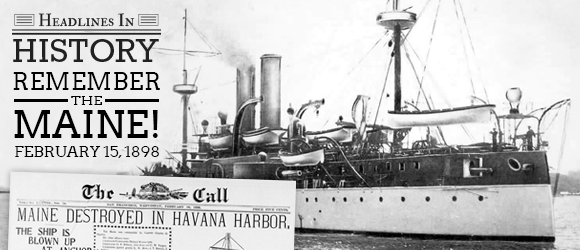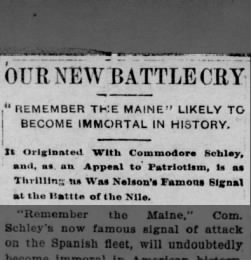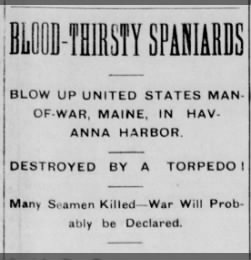

On February 15, 1898, at 9:40 p.m., the battleship USS Maine exploded then sank in Havana Harbor, killing about 260 of the 355 men on board. This international disaster, which was blamed on Spain, became an important catalyst for the Spanish-American War.
At the time, Cuban guerillas were engaged in a brutal fight for independence from Spain. Riots in Havana in January 1898 prompted the United States, which supported Cuba for both humanitarian and imperialistic reasons, to send the Maine to Havana as a show of strength. The ship, commanded by Captain Charles Sigsbee, arrived on January 25 and sat quietly in the harbor for the next few weeks.

But on the night of February 15, two explosions rocked the ship, sinking the Maine. The casualties were predominantly among the enlisted men, as they were quartered in the forward part of the ship, where the explosions occurred.
Although there was no hard evidence that the sinking was caused by the Spanish, a sizeable portion of the American public began clamoring for retribution almost immediately, spurred on by “yellow press” accounts that focused on sensationalism more than fact. “Remember the Maine!” quickly became a rallying cry.
An official U.S. court of inquiry was set up soon after the loss of the Maine to investigate the cause. Its findings, which did not assign blame, revealed in March that the sinking was caused by an underwater mine, which had led to the explosion of the forward magazines. Under pressure from all sides, the pro-peace William McKinley finally saw war with Spain as inevitable (for a number of reasons, though the Maine was the most visible instigating event). President McKinley asked Congress for a resolution of war, which was declared on April 25.

In later years, two other major investigations into the loss of the Maine were completed. A second official investigation in 1911 came to the same conclusion as in 1898: the Maine had sunk as the result of a mine. However, an investigation led by Admiral Hyman Rickover concluded in 1976 that the explosions were caused by a coal-bunker fire adjacent to one of the ship’s magazines. Disagreement and speculation on the cause of the sinking continues to this day.
Learn more about the sinking of the USS Maine and the Spanish-American War on Newspapers.com. You can also find some additional records from the Spanish-American War on Fold3, including the Service Record Index and compiled service records for Florida.


Very interesting!
Unsupported allegations. Nothing New
Very VERY interesting!!!
Will the poor people of Cuba ever have peace? No wonder they have fled to the America’s
My father was born the day before this happened, 14 Feb. 1898. This was very interesting to me to know the events of that day. It was a sad time for the families involved.
The mast from the battleship Maine is on display, along with the history behind it, in Arlington National Cemetery.
I found this article really imformitive.They didn’t teachl us (teachers) in history class or world history class.I do remember the saying Remember the Maine from watching old black and white war movies..Your never to old to learn . .
Interesting!
Now all this makes a lot of sense; and the poor Cubans are still battling to get the foreigners out, Americans and Spaniards. The Americans still find evil in anybody except Americans (cf. Vietnam). A coal bunker fire makes a lot of sense since neither the Spaniards nor the Cubans had torpedo’s at the time.
If that was today Fox News will be broadcasting “Act of Terror” lol
Rod, the term ‘torpedos’ at that time referred to floating mines.
HASTE MAKES WASTE.
There’s a lot of things I wish I had the answer to, like where the heck did Custer die? Up on the hill? Down by the creek? maybe in the Valley? And the biggest question is, why do people care? another interesting point is who went to their aid and rescued the survivors? The Spaniards so what’s up?
Coal bunker fire. The sheeting of the hull was blown outward, so it was not an external attack . almost all crew on board that were killed were black, thus likely a Yankee cook up for an invasion pretext.
Rod, the word torpedo meant a mine, in the vernacular of the day, as in “damn the torpedoes, full speed ahead!” These were used for nearly a hundred years before the Maine explosion. Nonetheless, it was a handy excuse to declare war on Espana and quickly take Cuba, the Phillipines, Guam, Puerto Rico, and other territories from Spain as well as worldwide influence.
Yep you said it ! And Mexiico and tried for Canada and Saddam
WMDs , Vietnam, Korea , soon Ukraine. Always instigating war but never following through with peace at the end, only more turmoil.
I blog often and I really appreciate your content.
This great article has truly peaked my interest.
I will book mark your website and keep checking for new details about once per week.
I subscribed to your RSS feed as well.